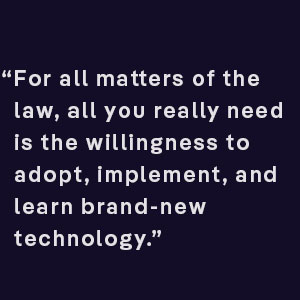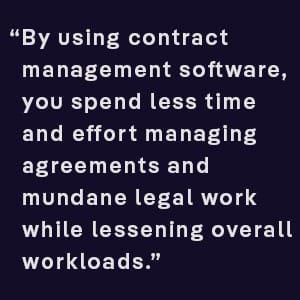Back when I was a first-year associate lawyer, on my third day of work, a senior partner approached me and asked that I “download and print all of Facebook.” The social media platform was still in its infancy, but downloading and printing the entirety of Facebook seemed exceptionally challenging even then. I took on this task rather confidently and enthusiastically, though. I figured out the cost to download and, well, print off Facebook, rent space in a warehouse, take care of the logistics around shipping, and transport all of the printouts to the storage site. Then, during a follow-up meeting, I came to realize the partner’s misunderstanding of technology, not to mention my own error in taking on this now laughable endeavor — without taking time to think about the necessary solution or outcome.
Without question, then, I’ve learned a few things like the above as a traditional lawyer turned technology-forward attorney. From these learnings, I realize that it’s never been more necessary to act on legal transformation than it is right now. That’s fundamental because it’s never been more important to be efficient, effective, and strategic in legal practice than it is at the present moment.
The practice of ‘Awesome Law’ in Legal Transformation
I’ve certainly had a more technology-focused career than most other lawyers. But I started out in a rather traditional fashion. In the beginning, I was convinced litigation was my true calling. So, I started out as a judicial clerk before joining a firm with clients in the energy, media, and pharmaceutical industries. Still, I wasn’t satisfied being a litigator; I chose to work on technology projects, instead of going to court, and eventually started my own law firm focused on technology start-ups. I later joined a technology company as a GC and corporate secretary and then ContractPodAi as a GC and chief (technology) evangelist.
These days, as a legal executive, I advise customers on their digital and legal transformation journey. I support them as they employ operational, analytical, and strategic digital solutions for their legal teams, leading them to even greater success. Just like the original technology product evangelist Guy Kawasaki, I’m genuinely driven to make lawyers and allied professionals that much better at their jobs and in their respective roles.
Actually, this strikes at the heart of what I describe as ‘awesome law.’ Being an ‘awesome lawyer’ — not only for ourselves but also for those working with us — means fully embracing legal automation and pursuing the legal work that’s the most meaningful.
Past All of the ‘Smoke and Mirrors’
Although lawyers sometimes think there is magic to everything we do, a lot of our smaller, everyday tasks are automatable — at least partially. Think digital tools like contract management systems, for instance. By using this kind of software to the fullest advantage, you spend far less time and effort managing agreements, decreasing the amount of mundane legal work while lessening overall workloads. (Let’s face it, who really wants to spend their time manually reviewing contracts and extracting key obligations when they can be enjoying bespoke candle making!).
No Legal Surprises!
In the legal and operational sense, lawyers want to have all of the answers and be able to tell colleagues and clients what they should and shouldn’t be doing. What lawyers don’t want are surprises. That’s why I’m so excited by the latest legal technology and encourage legal and allied professionals to adopt the same: it helps us know what’s going on in legal (and prevent any middle-of-the-night surprises!), provide better counsel or advice — and, ultimately, serve as strategic and transformative figures within the enterprise.
For all matters of the law, all you really need is the willingness to adopt, implement, and learn brand-new technology. In other words, you needn’t be a technological expert like a computer programmer or scientist (Trust me!).
Legal Transformation
Whether you’re a self-professed technology nerd like me or not, you’re less likely to draft a document with a feather pen and complete research by candlelight. In fact, you’re more likely to adopt some form of automation for your contract management and other legal use cases. After all, with expectations of legal teams growing and in-house legal budgets increasing, in-house lawyers need to embrace new legal technology and invest in artificial intelligence, in particular. They can use it to streamline those repeatable, mundane tasks, receive deeper insights — and further the transformation of corporate legal departments. (They just might be able to download and share the entirety of Facebook now, too!)
If you want to begin your own legal transformation journey, read our e-book, “Three Stages of Legal Digital Transformation.” It includes many helpful tips for you and your legal team, including how to go about choosing the right technology vendor.
Author:

Jerry Levine
Connect with us on Linkedin





